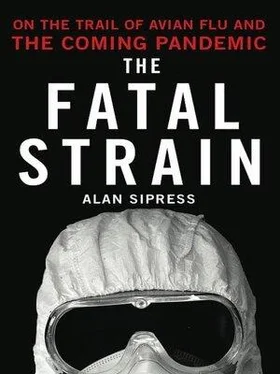As soon as they arrived, it was clear they desperately did not want to be there. “They didn’t accept that it was avian influenza,” recounted Dr. Nur Rasyid Lubis, the hospital’s deputy director and head of its outbreak response team. “They tried to refuse all treatment. We could treat them only because their condition made it impossible for them to resist. But if they had been healthy enough to walk, they all would have run away.”
The family members balked at giving blood for testing. Several initially refused to go to the isolation ward set up for suspected bird flu cases. “None of us believed it was bird flu,” Puji’s sister-in-law later recounted. “We thought it was black magic. Everyone in the family was getting sick and no one else was. Someone had put a spell on our family.”
That account was offered to me by the wife of Puji’s younger brother Jones. I must have given her an inquisitive look because she added, “Black magic is very common in our place.”
True to local practice, relatives and in-laws had streamed out of the mountains to keep vigil at the hospital. They crowded into the large room where their kin were lined up in two facing rows of metal cots and scoffed at the insistent advice of hospital staff that they put on masks and gloves to protect themselves.
Puji’s oldest son died just one day after being admitted to the hospital. One of Puji’s sisters succumbed next.
As Jones watched his kin perish in the beds around him, he confided to his wife, “If I stay here, I’ll be dead.” Jones’s fever had topped 102 degrees and showed no sign of breaking. Fresh X-rays revealed that his left lung had entirely clouded over and his right lung was nearly as bad. He told his wife it was time to leave.
“I was losing hope,” Jones later recounted in a raspy voice, almost a whisper. His stare was blank beneath thick eyebrows, and his cheeks were sunken. He had been a young tough. Now his arms and legs, covered with elaborate swirling tattoos of red and green, had grown emaciated. He had dropped twenty pounds during his struggle for survival, and his tank top hung off his shrunken frame. “I was afraid of the hospital,” he continued. “I thought I was going to die. I can’t remember much, but I remember running away.”
At that moment in the retelling, Jones fell silent. His wife, a chatty twenty-three-year-old with long hair parted in the middle and tied in the back, picked up the thread. “We were watching our family die one by one,” she recalled. “We thought the hospital could not cure him.”
Jones had slipped out of the hospital with his wife and two young sons and hailed a taxi on the street. They told the driver to take them to a congested, working-class quarter of Medan jammed against the edge of the city airport. The houses were jumbled together along narrow alleys. Young men lingered on cramped front porches. Drainage ditches ran past the doorsteps and chickens pecked in the fetid black water. Every few minutes, an airplane would pass overhead with a tremendous roar. A year earlier, an Indonesian jetliner had crashed into the neighborhood moments after taking off, killing at least 149 people, including dozens on the ground, yet the incident was soon all but forgotten outside the quarter. This was the kind of place where Jones could disappear.
Jones also had relatives there to take him in. One, a distant relation, was a doctor with a practice on the main boulevard. Jones went to see him. The doctor examined Jones, prescribed some medicine, and offered an unwelcome diagnosis. “You have bird flu,” the doctor said, urging the feverish fugitive to return to Adam Malik Hospital. Jones balked.
If Jones could not find the answer in the city, he reasoned, he should go home to the mountains. He and his family hired another taxi and fled Medan. They drove deeper and deeper into the jungle, following the steep winding road and treacherous switchbacks up and up and up to the highlands of Karo, where cool breezes offered relief and promise of a cure.
By the time health officials in Sumatra realized they had a problem, it had already been two weeks since the eldest Ginting sister, Puji, fell sick, and six others were already desperately ill.
District health and veterinary officials drove to Kubu Sembilang and summoned the villagers. “Bird flu is here, now, among you,” an animal-health officer told the hundreds of people who gathered at the village hall. “To break the chain of infection, we have to depopulate your livestock.”
The cooperative spirit lasted precisely one day. Trouble began when provincial veterinary officials drove up from Medan, pulled rank on their local counterparts, and announced that all the samples taken from local poultry were negative for bird flu and the mass cull, though prudent, had been unnecessary. The villagers were livid.
Kubu Sembilang was in revolt by the time a team of disease investigators from the provincial government arrived in the highlands later that week. Local officials pleaded with them to go home. “We’re frightened something might happen to you,” one local health officer warned them. “You might be attacked.” The investigators retreated.
A day later, the provincial team returned reinforced by disease specialists who had flown in from the national health ministry in Jakarta. This time they managed to enter Kubu Sembilang. But the villagers refused to answer any questions: What was the possible source of the infection? How did the victims catch it? Was anyone else in the village sick? After several frustrating days, the team from the national health ministry withdrew to Jakarta and never came back. They were too scared. Villagers had threatened to stab them.
“We chased them away,” Puji’s brother-in-law admitted to me when I met him a few weeks later. The man had a hard face and bitter eyes. His tone grew more menacing the longer I peppered him with questions. “There is no such thing as bird flu. It’s bullshit,” he continued. “This is all simply black magic.”
That last line was recited to me over and over as I explored Kubu Sembilang. There were no sick chickens in the village and only one sick family. What else could it be but an evil spell?
A neighbor laid it all out for me. “This is something supernatural,” began Tempu Sembiring, a fifty-year-old orange grower with a balding pate and salt-and-pepper mustache. An unlit cigarette bobbed between his lips as he recounted the tale. “Their father used to be the chief gangster in this area. He took his power from a spirit called Begu Ganjang at a holy place in Simalungun. This is revenge for worshipping at that place.”
According to Batak lore, Begu Ganjang can be conjured by offering him the liver, heart, and gizzard of a red rooster wrapped in four banana leaves along with seven pieces of chili pepper and chunks of banana. These are to be placed around the perimeter of a late-night ceremony, at the four points of the compass. The rooster’s blood is drained into a coconut husk at the center and then the spirit summoned. He is believed strongest at a mystical site in the district of Simalungun on the shores of Lake Toba, in the heart of the Bataks’ highland domain. Once called, Begu Ganjang will do his master’s bidding, delivering wealth and protection. But the spirit will remain faithful only as long as periodic oblations are offered, and unpaid debts to Begu Ganjang can be collected from kin in blood.
“Ponten was quite powerful,” Sembiring continued, lowering his voice to a whisper as he mentioned the patriarch’s name. “When he died five years ago, his friends came all the way from Jakarta. The condolence flowers stretched all along the road. They stretched from there,” he said, pointing at the Ginting homes in the distance, “all the way to here.” He scanned his finger past the soccer field, the village church, and the dirt track leading up into the orchards. “The family had to be sacrificed. It is a payback for what happened in the past.”
Читать дальше











